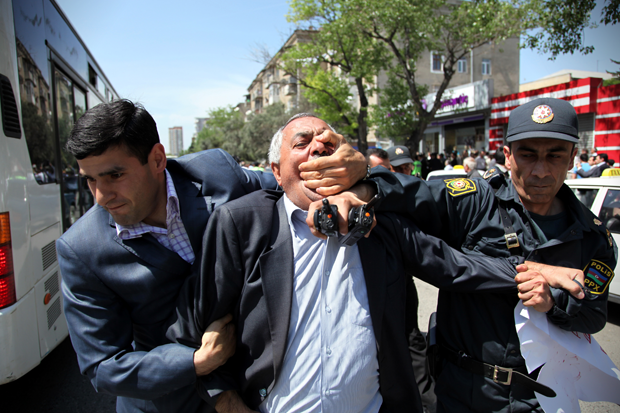Elections were held across Ukraine Sunday for regional leaders for the country, the Washington Post reports. These elections were widely seen as meant to send a mandate from the people to the policies of Ukrainian President Petro Poroshenko. Although the results of the elections will likely not be counted for another couple of days, the atmosphere of the elections themselves only highlighted the deepening troubles that Ukraine faces.
Exit polls at fist estimated that there was only about a 36% voter turnout; an incredibly low amount for a country whose people only recently ousted its leader due to, among other things, not having their voices heard. A Ukrainian source later claimed that participation overall was around 46%, although that is not much better. Across the country, people seemed disinterested and dissatisfied with the elections. In one city, elections were not even held at all due to reported ballot errors. And of course, elections were not held in the regions controlled by pro-Russian separatists.
Certainly, Russian Intervention and the War in Donbass have been very pressing problems for Ukraine over the past year and a half. However, according to many voters, Russia is not the primary concern of average Ukrainians anymore. Instead, they are focused on the increasingly troubled economy and corruption. Ukraine is experiencing a drastic rising in prices and its national currency has been devalued. Corruption remains persistent, as oligarchs in the country retain much of the power in the country.
As the threat of Russia is beginning to recede, and with a ceasefire between Ukraine and the rebels being largely respected, Ukrainians are now turning to the more practical problems that face the country: how will they get food on the table, and how will they reform their troubled government? Just because the Poroshenko Administration is Pro-Western does not change the urgency of these problems.
However, when Poroshenko came into office, he promised speedy and meaningful reform. In his self-described “kamikaze government,” he told people among other things that Ukraine would join NATO by 2020, and on that same year, his country would start its application to join the European Union. Both of these projections are rather optimistic to say the least, but to the Ukrainian people, this gave them hope that their corrupted government could break away from the oligarchs and join the West as a developed nation.
But as time dragged on, the economy only grew worse. Some have felt that corruption has only gotten worse in the country. Reforms promised by the so-called “kamikaze government” have been slow-coming. This caused a disillusionment among the public, leading to low-energy elections with very low voter turnout. The Ukrainian activists that led the Euromaidan protests in 2014 have been particularly dissatisfied, claiming that Poroshenko has simply maintained the status quo of corruption and little reform in the country. His approval rating is at a current low of 26%.
The elections were not all bad signs; many groups have claimed that the elections have become much more transparent than they have been in the past. But Poroshenko’s reforms have been disappointing. Some have decided to vote for Ukraine’s Opposition Bloc, ousted President Victor Yanukovych’s old party which favors non-alignment and warm relations with Russia, just to send the message to the President that he is not doing enough to help the country. And he is not.
From the looks of various exit polls, it looks like the governing parties will retain control of many cities in the Western and Central regions of the country. But just because Ukrainians there prefer the government to the even more corrupt Opposition Bloc does not mean that they are happy with the government. If President Poroshenko wants to maintain, and even gain, support for his country’s path towards the West as a liberal democracy, then he must make meaningful reforms to cut back on the reach of the oligarchs in his country and make Ukrainians feel more secure about their economy.
 A model pipe in Turkmenistan, a symbol of the country’s soon-to-be booming natural gas industry.
A model pipe in Turkmenistan, a symbol of the country’s soon-to-be booming natural gas industry.



